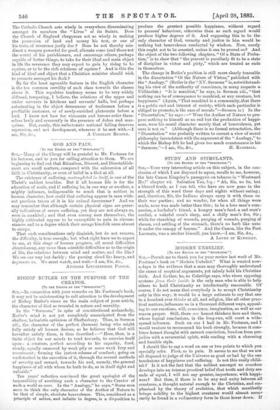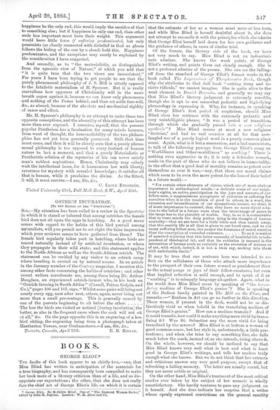MODERN UNBELIEF.
[To THE EDITOR OF THE "SPECTATOR."] SIR,—Permit me to thank you for your review last week of Mr- Footman's book on "Modern Unbelief." What is wanted now- a-days is the evidence that a man may thoroughly understand the stress of sceptical arguments, yet calmly hold his Christian faith. And further, he, as Coleridge says, who views opposing. systems from their inside is the only man who is able to help others to hold Christianity as intellectually reasonable. 0f course, I do not mean that everybody is to accept Christianity only in this way; it would be a large estimate to say that one in a hundred ever thinks at all, and religion, like all other prac- tical matters, influences us in a thousand different ways, appeal-- ing to our emotions, will, conscience, imagination, as well as our reason proper. Still, there are honest thinkers here and there, whose logical conclusions, in the long-run, will exert a wide- spread influence. Such an one I hail in Mr. Footman, and I would venture to recommend his book strongly, because it corn- bines honest thought with earnest conviction, freedom from pre-- judice with a reverential spirit, wide reading with a charming and forcible style.
I should like to say a word on one or two points to which you specially refer. First, as to pain. It seems to me that we are all disposed to judge of the Universe as good or bad by the one touchstone of happiness and suffering. Is not this really child- ish? Is it not the fact that the noblest amongst us somehow develope into an intense practical belief that truth and duty are ends of equal, I will not say greater, importance, with happi- ness ? But then, if there is to be any real unity between all creatures, a thought natural enough to the Christian, and em- phasised by the theory of evolution, that which manifestly brings nobility to the highest creatures would almost neces- sarily be found in a rudimentary form in those lower down. If happiness be the only end, this would imply the sacrifice of that to something else; but if happiness be only one end, then other ends less important must have their weight. This argument would have little force 7f suffering predominated, but only pessimists (as closely connected with disbelief in God, as gloom -follows the hiding of the sun by a cloud) hold this. Happiness predominates, and the exceptions may surely be explained by -the eonsideration I have suggested.
And secondly, as to "the materialistic, as distinguished from the agnostic view of Nature," of which you add that -" it is quite true that the two views are inconsistent." For years I have been trying to get people to see that the ,purely phenomenal philosophy of J. S. Mill is utterly opposed to the fatalistic materialism of H. Spencer. But it is really marvellous how opposers of Christianity will in the same breath argue against it, because we can know only phenomena -and nothing of the Power behind, and then set aside free-will, s&c., as absurd, because of the absolute and mechanical rigidity -of cause and effect.
Mr. H. Spencer's philosophy is an attempt to unite these two -opposite conceptions, and the absurdity of this attempt has been more than ever exposed. I conceive, myself, that the present popular Pantheism has a fascination for many minds because, from want of thought, the irreconcilability of the two philoso- phies has not yet been generally perceived. Still, that time must come, and then it will be clearly seen that a purely pheno- .rnenal philosophy is too opposed to every instinct of human
• nature to last a moment, and that a purely Materialistic or Pantheistic solution of the mysteries of life can never satisfy man's noblest aspirations. Hence, Christianity may calmly wait the intellectual issue, for it harmonises law with liberty, reverence for mystery with revealed knowledge ; it satisfies all -that is human, while it proclaims the divine. As the fittest, it will, it must survive.—I am, Sir, &c., C. LLOYD ENGSTRo.M.
United University Club, Tall Mall East, S. W., April 25th.



































 Previous page
Previous page